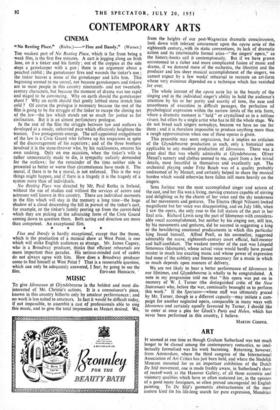CONTEMPORARY ARTS
CINEMA
“ No Resting Place." (Rialto.)—" Fine and Dandy." (Warner.)
THE weakest part of No Resting Place, which is far from being a weak film, is the first five minutes. A cart is jogging along an Irish lane, on it a tinker and his family ; out of the coppice at the side steps a gamekeeper with a gun ; there is an argument about a poached rabbit ; the gamekeeper fires and wounds the tinker's son ; the tinker heaves a stone at the gamekeeper and kills him. This beginning seemed to me unreal, not because gamekeepers and tinkers are to most people in this country nineteenth- and not twentieth- century characters, but because the moment of drama was too rapid and staged to be convincing. Why on earth should the gamekeeper shoot ? Why on earth should that gently lobbed stone stretch him cold ? Of course the prologue is necessary because the rest of the film is going to be the struggle of the tinker to escape the closing net of the law—the law which stands not so much for justice as for civilisation. But it is an almost perfunctory prologue.
In the rest of the film the struggle between law and outlaws is developed at a steady, unhurried pace which effectively heightens the tension. Two protagonists emerge. The self-appointed embodiment of the law is a Civic Guard who follows up his suspicions in spite of the discouragement of his superiors ' • and of the three brothers involved it is the stone-thrower who, by his recklessness, ensures his own undoing. Only on one occasion, when the tinker's wife is rather unnecessarily made to die, is sympathy unfairly demanded for the outlaws ; for the remainder of the time. neither side is presented as better or worse than circumstances have made it. The moral, if there is to be a moral, is not enforced. This is the way things might happen, and if there is a tragedy it is the tragedy of a system more than of individuals. No Resting Place was directed by Mr. Paul Rotha in Ireland, without the use of studios and without the services of actors and actresses well known in this country. There are individual moments in the film which will stay in the memory a long time—the huge shadow of a cloud descending the hill in pursuit of the tinker's cart, for example, or the tinker's family peering up from the carrot-field which they are picking at the advancing form of the Civic Guard coming down to question them. Both acting and direction are more than competent. An exceptional film.
Fine and Dandy is hardly exceptional, except that the theme, which is the production of a musical show at West Point, is one which will strike English audiences as strange. Mr. James Cagney, who is a Broadway producer, thinks that efficient rehearsals are more important than parades. His serious-minded cast of cadets do not always agree with him. How does a Broadway producer come to find himself at West Point ? That is a reasonable question, which can only be adequately answered, I fear, by going to see the


































 Previous page
Previous page